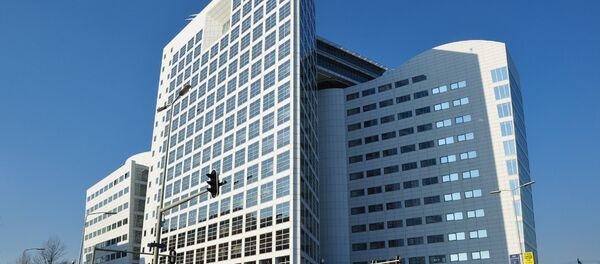WHO IS NEXT
Russia has signed but never ratified the Rome Statute on establishing the ICC, meaning that Moscow had no significant obligations under the treaty and that the ICC could not have jurisdiction over Russian citizens.
Discussions over Russia’s withdrawal may well have been amplified by the fact that three African nations revoked their membership in the court earlier. Over the past month, the Hague-based court saw Burundi, South Africa and the Gambia withdrawing their support.
"There is a marked difference between what Russia just did and what South Africa, Gambia and Burundi did: the three African states were parties (having ratified and not merely signed the Rome Statute of the ICC) and therefore had significant obligations (including arresting individuals indicted by the ICC) and giving the ICC jurisdiction over their nationals," Rene Provost, a professor from McGill University in Montreal, told Sputnik.
At the same time he stressed that Russian action in regard to the ICC is likely to have some negative impact, the expert noted.
"There is a real impact to Russia's decision, because it signals the low political cost of withdrawing support for the ICC," Provost said.
Alex Whiting, a professor at Harvard Law School who formerly worked in the Office of the Prosecutor at the ICC, mentioned that after a spate of departures “all eyes were on Kenya and Uganda because leaders in both countries have talked about leaving.”
But Uganda affirmed its support and commitment to cooperate with the ICC earlier this week, while Kenya lashed out against criticism of withdrawals, but was mute on its membership perspective, just urging to work collectively for reform at the forthcoming debate session of the ICC’s annual meeting.
Namibia meanwhile said withdrawal remained an option, but noted a decision had not been taken despite media reports that the cabinet decided on withdrawal last year.
But it was the Philippines' president who made the headlines. On Thursday, just one day after Russia's departure, Rodrigo Duterte indicated he might follow Russia and withdraw from the ICC, citing criticism from Western nations for a rash of killings unleashed by his anti-drug campaign, which has killed more than 4,000 suspected addicts and dealers since July and has been widely decried by human rights organizations.
WHAT HAPPENS TO THE COURT
At first, African nations were very supportive of establishing the ICC, which was aimed at holding responsible individuals that had committed crimes against humanity all across the continent. But over the years this stance dramatically changed with more countries calling the court "anti-African."
In the first years after its establishment, the ICC prosecuted crimes in the African continent only, with the first case outside Africa being opened by tribunal just this January. This was an investigation of the Russia-Georgia war of 2008.
In addition to 10 current full-fledged investigations, the international tribunal is also leading the same number of preliminary investigations, including possible war crimes in Iraq, the Palestinian territories and Ukraine, and allegedly in Afghanistan, according to a recent Foreign Policy publication.
Coincidence or not, but two days prior to Russia's announcement on withdrawal, the ICC presented its preliminary report on the "international armed conflict between Ukraine and the Russian Federation" in Crimea with quite a critical stance on Russian actions on the peninsula in 2014.
"ICC can continue to investigate alleged crimes by nationals of non-State Parties that occur on the territory of a State Party. So the ICC will continue to investigate in Georgia and Ukraine, where Russian nationals may be implicated, and will likely start an investigation soon in Afghanistan, which could touch on actions by US citizens," Whiting told Sputnik.
He expressed doubts over the readiness of states involved to cooperate with the investigators and surrender its citizens if they are charged.
"But the existence of charges would have moral force and would constrain the ability of those charged to travel to certain countries, in particular States Parties to the Rome Statute,” Whiting suggested.
His opinion was echoed by the Canadian international law expert.
"What's the point? Well, if individuals are identified and subject to an Interpol arrest warrant, that means that they cannot leave Russia. The same obtains for US citizens targeted by the ICC for acts committed in Afghanistan. That may not matter to some, but it might for military or political leaders that may be held accountable on the basis of the doctrine of command responsibility," Provost stated.
At the same time, practice showed that ICC does not always have enough power to enforce its own arrest warrants and must precariously rely on the compliance of its members. The brightest example is the case of Sudanese President Omar Bashir, who is the only incumbent head of state wanted for genocide, war crimes, and crimes against humanity committed during the conflict in Darfur.
Despite two international arrests warrants, Bashir was not arrested while attending an African Union summit in Johannesburg in 2015 as the government of South Africa, then a full member of ICC, claimed he had immunity as the head of an AU member state. While the local high court was hearing arguments over an application that would have forced the Pretoria government to arrest him, Sudanese leader was safely landing in Khartoum.
On Thursday, Sudan welcomed Russia's snub of the ICC with Ghareb Khidir, the spokesman for Sudan's Foreign Ministry, saying that the Russian gesture gives "strong support to the African position against the ICC," describing the court as a "total failure."





